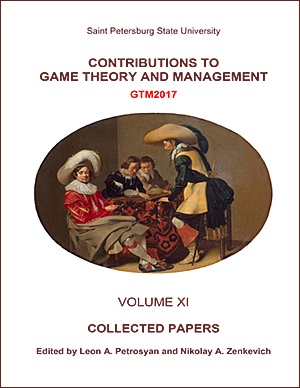Acceptable Points in Games with Preference Relations
Abstract
For games with preference relations we introduce an acceptability concept. An outcome of a game is called an acceptable one if no players which have an objection to it in the form of some strategy (all of the required definitions are clarified in the introduction, see section 1). It is easy to show that every outcome at equilibrium point is an acceptable one but the converse is false. An aim of this article is a finding of conditions for existence of acceptable outcomes for games with preference relations (see sections 2 and 3). These conditions relate both to strategies and the preference relations of the players. The main requirements concerning the preference relations are acyclic and transitivity. It is a very important fact, that for game in which the sets of strategies of players are finite, the set of acceptable outcomes is non empty. For the class of games with payoff function acceptability condition is equivalent to individual rationality condition. An example of infinite game in which the set of acceptable outcomes is empty is given in section 4.
Keywords:
game with preference relations, Nash equilibrium point, general equilibrium point, acceptable point
Downloads
References
Downloads
Published
How to Cite
Issue
Section
License
Articles of "Contributions to Game Theory and Management" are open access distributed under the terms of the License Agreement with Saint Petersburg State University, which permits to the authors unrestricted distribution and self-archiving free of charge.




